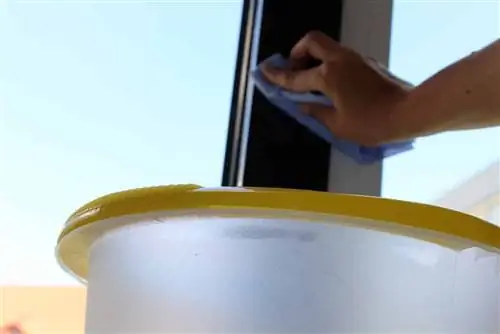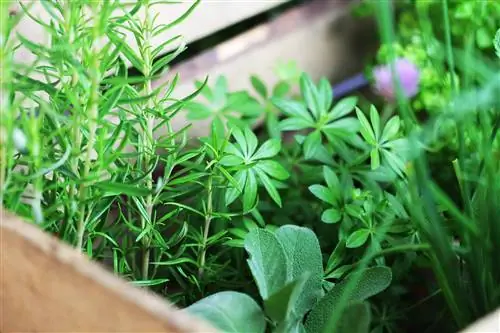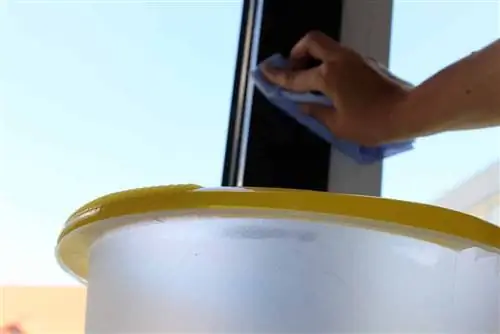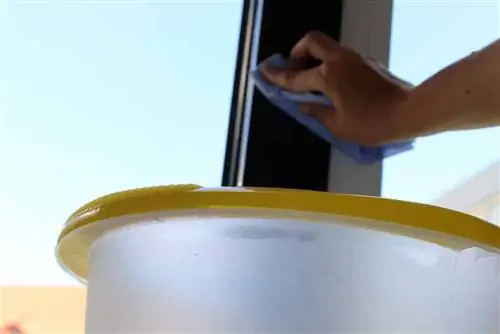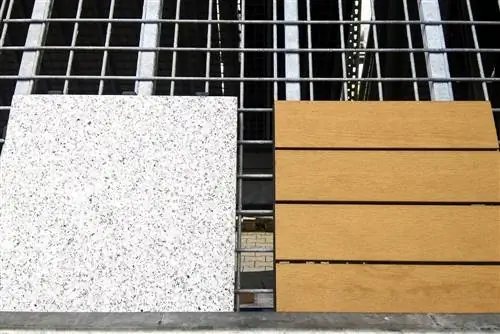- Author admin caroline@plants-knowledge.com.
- Public 2023-12-17 03:39.
- Last modified 2025-06-01 06:48.
Our great-grandmothers probably used denatured alcohol to clean windows. The high alcohol content of the home remedy has an excellent cleaning effect and leaves windows sparklingly clean and streak-free - without much physical effort. The most important thing is the right mixing ratio. However, alcohol also has a number of disadvantages that should not be ignored here. Instead, there are other, equally effective and less harmful home remedies available to you.
Why windows often show streaks after cleaning
After cleaning the window, if you use unsuitable cleaning agents, streaks will quickly appear that are difficult to remove. However, streaky window glass does not have to be the case, as this is usually caused by limescale deposits. The lime comes from the water used for wiping, which is why the streaks mainly occur in regions with hard (i.e. high lime content) water. Furthermore, a grease film caused by insufficient cleaning or unclean wiping water are common causes that should be avoided.
Tip:
Never clean your window fronts when the sun is shining, because then there will almost certainly be streaks. The reason is that the wet window panes dry quickly due to the sun, which you cannot polish so quickly.
Spirit water counteracts the formation of streaks
Denatured alcohol is a high-percentage alcohol (ethanol) that has been made undrinkable by adding certain substances. This process is known in technical language as denaturation. Ethanol has some properties that make it suitable for use as a cleaning agent. This includes the high fat-dissolving power, but also the ability to neutralize limescale. That's why spirit water reliably prevents the formation of window streaks - neither limescale nor grease has any chance of depositing on the window.
Other benefits of spirit water when cleaning windows
In addition to its high cleaning performance, ethanol has other positive cleaning properties:
- Water on the window evaporates faster
- Ethanol leaves a thin film on the window pane that prevents fogging or icing
- that's why the product is perfect for cleaning car windows, especially in winter
Make your own window cleaner
An alcohol window cleaner is quick and easy to make yourself. All you need is a bucket of lukewarm water into which you add a generous splash of alcohol and dishwashing liquid. The mixing ratio is given by some as 1 part water, 1 part alcohol and a dash of detergent, although adding that much alcohol is basically not necessary. For a standard 10-liter bucket, one shot from the bottle is actually enough. What is more important, however, is that the wiping water is neither too cold nor too hot: lukewarm window water supports the cleaning performance best.
Do you also have to add vinegar and ammonia to the cleaning water?
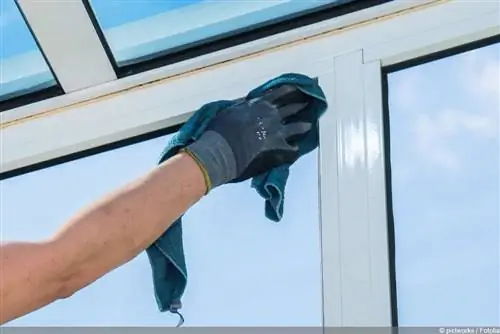
Every housewife has her own recipe for making alcohol window cleaner. Many people also mix the alcohol with vinegar and ammonia. The latter in particular does not provide any additional benefit, as it is also just an alcohol with the same properties. Vinegar is basically not necessary due to similar cleaning properties, but - if you use apple cider vinegar - it can alleviate the unpleasant, pungent smell somewhat. It only makes sense to add a detergent as this supports the cleaning performance. Be sure to have a second bucket of lukewarm, clear water ready to use for wiping.
Tip:
Even if your mother taught you this: Never use newspaper to wipe the windows. This tip comes from times when heating was done with coal, the windows were smeared with soot and had to be sanded clean with coarse newspaper. To avoid scratching the window glass, use a soft microfiber cloth instead.
Cleaning windows and frames without leaving streaks - this is how it works
If you have all the utensils for cleaning windows ready, the best way to achieve a streak-free shine is as follows:
- Clean the window frames first.
- First, sweep away coarse dust and dirt with a hand brush.
- Then wipe the window frames clean with a wet cloth.
- Do not use alcohol!
- Instead, wipe with lukewarm water and dish soap.
- A neutral cleaner is also suitable.
- Rub the wet frames dry with a slightly damp cloth.
- Never wipe the plastic frame dry, otherwise scratches will occur.
- Now wipe the window panes with the spirit water.
- Do this from top to bottom.
- Always start on the outside and work your way in.
- First wipe the window panes wet.
- If possible, use a microfiber or soft cotton cloth.
- Take off the excess water with a chamois cloth or similar.
- Polish the discs with a dry and clean cotton cloth.
Tip:
Don't throw away used cotton shirts or tea towels, as these can be used excellently for cleaning windows. However, wash them first in the washing machine at at least 60 °C and without fabric softener to remove any residue - this could leave streaks on the window pane.
Be careful with plastic windows - disadvantages of alcohol
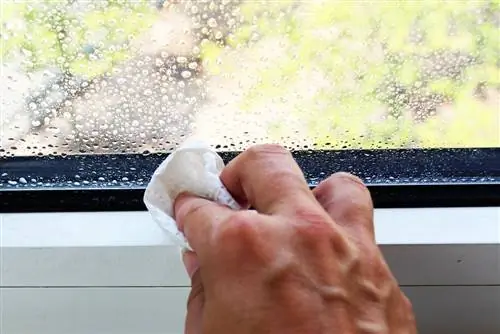
As good as alcohol is for cleaning windows, you have to be careful with the agent. Plastic windows in particular do not tolerate spirit water, as this attacks the material and makes it brittle. This not only leads to premature material fatigue, but also results in unsightly discoloration. The same applies to soft plastic parts, such as rubber seals. Responsible for this are the admixtures added during denaturation, especially methyl ethyl ketone (MEK) and diethyl phthalate (a plasticizer). These substances can also dissolve paints and varnishes. The home remedy should also be used with caution for other reasons:
- strong, pungent smell
- this doesn't go away quickly and can cause headaches
- Like all alcohols, highly flammable - a small spark is enough
- must not be drunk under any circumstances
- must under no circumstances fall into the hands of children - fatal!
Tip:
Furthermore, denatured alcohol not only attacks plastic, but also your skin. It dries them out, which can lead to unpleasant irritations and, in the worst case, even eczema. Always wear gloves when cleaning windows.
Which home remedies are suitable for cleaning windows without streaks?
To avoid the disadvantages of spirit water, especially with plastic windows, you can also use other, less aggressive home remedies. Basically, it is completely sufficient to clean the windows with dishwashing water. However, only add a splash of detergent to the lukewarm water so that it does not foam too much and cause streaks. For the same reason, you should put the water in the bucket first and then the dish soap. Rinsing with clear, warm water and adding a generous splash of vinegar helps against limescale deposits. Its smell disappears very quickly and does not cause headaches.
Tip:
Vodka has also proven effective for cleaning windows, but has similar disadvantages. However, you should completely avoid coffee grounds - these only cause unsightly discoloration that is difficult to remove.

